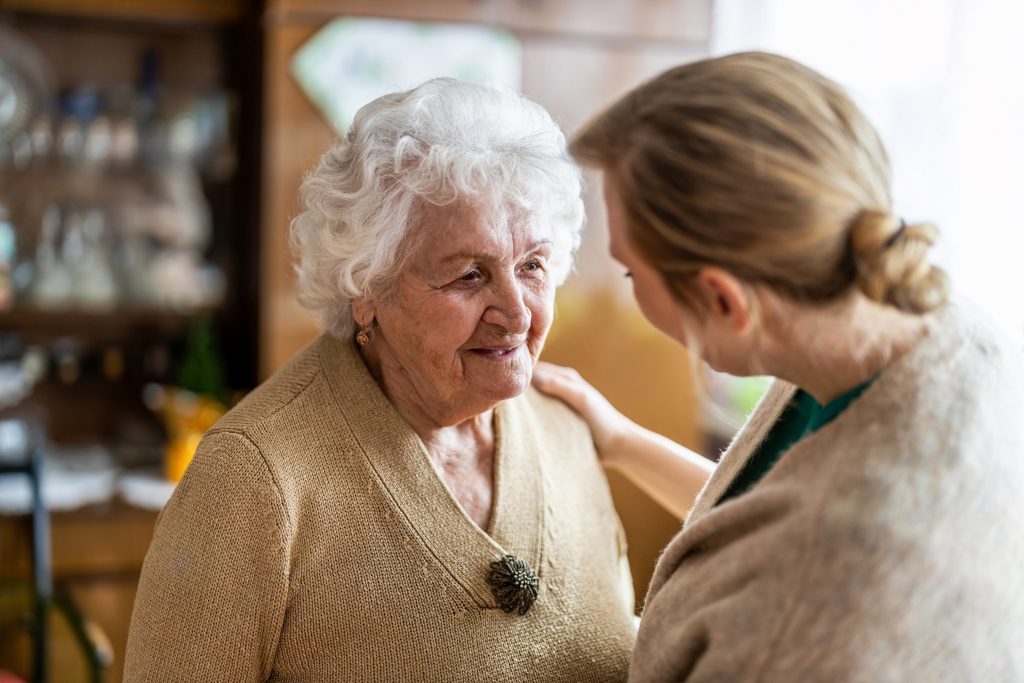Empathy – we know it’s important, we all need it, and we all want it – but what is it really? Sympathy and empathy are often confused with one another but have distinct differences. Sympathy is sharing the feelings of another and understanding their feelings from your own perspective, whereas empathy involves trying to understand another’s feelings from their perspective instead of your own. Empathy requires putting yourself in another’s shoes to gain perspective on why they may be feeling what they are feeling. It’s an important component in connecting with another person, and it is vital in today’s senior care.
Growing older can be hard. There are changes that occur to the body, changes in ability, changes in independence, and changes in relationships. As people grow older they become more vulnerable, and needs can increase. If you have a loved one in your life who is aging, it can be difficult to know how to best support them. Often times, empathy can be one of the most important things you can give them. In today’s culture where being youthful is praised, older adults are often left with the impression that they are insignificant or a burden if their needs increase. But each individual is inherently valuable, no matter their age, and empathy can help remind them of such.
Using Empathy to Care for Older Adults
If you are a caregiver for an aging loved one or you work in the aged care sector, there are several ways in which you can use empathy in your caregiving. Often times, caregiving becomes task oriented. With a focus on duties like bathing, dressing, and feeding, providing emotional support can get overlooked. By imagining what struggles or changes the older adult is going through, your focus may shift. What would it feel like to have others bathe, dress, or feed you? If you lived alone and didn’t receive many visitors, how would loneliness affect you? How would you react to facing daily or chronic health struggles or changes?
At Snyder Village, a life plan community in Metamora, IL, the focus is not only on providing for the physical needs of older adults but also the emotional and spiritual needs. Heather O’Brien, Health Center Administrator at Snyder Village, explains the importance of empathy in the care of residents and the approach her staff takes to ensure whole-body wellness. “Our staff believes it is important to take adequate time to get to know our residents and who they were over the course of their lives,” says Heather. “The areas that were important to a resident in their younger years continue to be important as they age. By gaining this valuable information, it allows the staff to engage in relevant person-centered conversations which enhance the comfort level of the resident and staff as they mutually work together to complete all care tasks and activities each day.”
Ways to Show Empathy
It can be difficult for an older adult to show or explain their needs. They may try to take on burdens themselves, such as physical limitations, financial stress, or loneliness without asking for help. Practicing empathy can help you identify needs they may be experiencing – even if they fail to voice them.
Ask How They Are Feeling – Even if you don’t suspect anything is currently wrong, checking in on your loved one’s emotions periodically will help build trust. The more you open up dialogue around your loved one’s feelings, the more they will feel comfortable sharing with you when they do need help.
Actively Listen – When trying to understand what someone is going through, listening is more important than talking. Give your loved one space to express their needs or concerns. Practice listening to understand instead of listening to respond. Keep eye contact with them while in conversation and use open-ended questions to encourage dialogue.
Don’t Focus on Quick Fixes – It can be tempting to offer a quick fix when a problem is identified but instead, try to understand the root cause of your loved one’s behavior or issue. Caring enough to target what is really going on will only help you both in the long run.
Practice Patience – So many of us are focused on moving quickly from one task to the next, but empathy forces us to slow down. If empathy requires us to look at life through the lens of our loved one, often times that means accepting a slower pace. Older adults may move slower, eat slower, and even think or speak slower. Trying to rush them to keep up with your pace will only create tension and stress. If an older adult is capable of feeding themselves, walking, or doing other tasks safely – just at a slower pace – let them. Empathy reminds us how important dignity and independence are to each of us, even if it involves handling life at a slower pace.
Caring for an adult who is aging or facing a progressive disease such as Alzheimer’s can challenge our patience. Trying to understand what they’re going through and validating their feelings can result in a better experience for everyone involved. A little kindness goes a long way.
Snyder Village in Metamora is a Life Plan Community that offers independent living, assisted living, memory care programs, skilled nursing care, therapy, and home care. For more information, call (309) 367-4300 or visit www.snydervillage.com.





